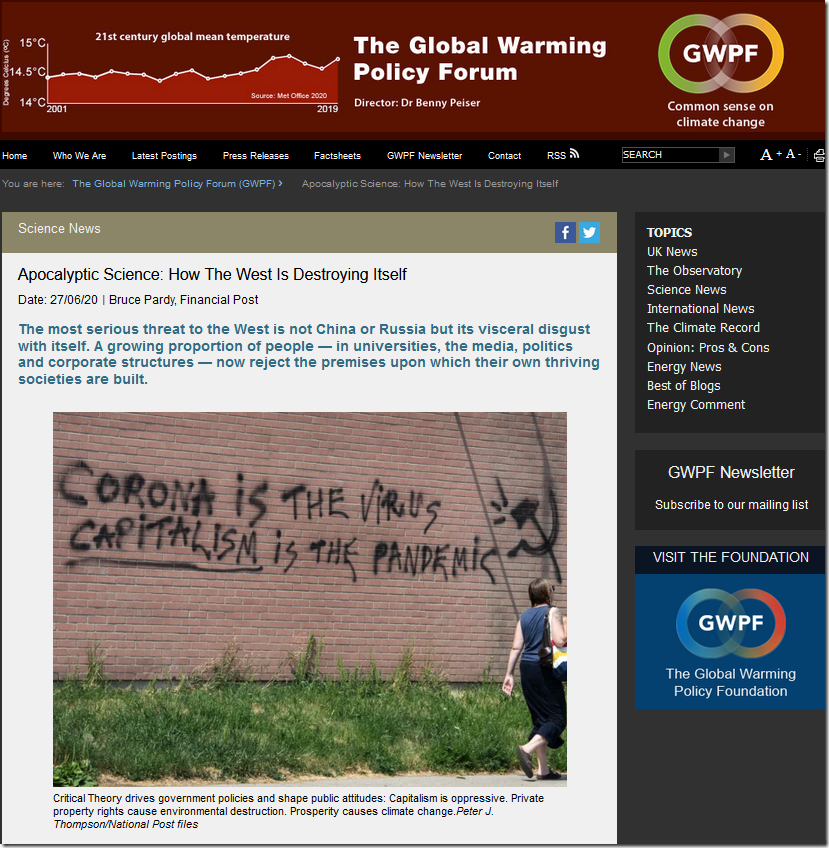By Paul Homewood
h/t Mr GrimNasty
From GWPF:

If you live in a Western nation like Canada in the 21st century, you have more freedom, prosperity and peace than most of the rest of the world at most other times in history. Yet these countries have never been at greater risk. The threat is not pandemics, climate change or war but something more insidious.
Modern Western civilization grew out of the Enlightenment of the 17th and 18th centuries. The ascendancy of reason in human affairs produced the scientific method and later the Industrial Revolution. Add in the rule of law, individual liberty, private property and capitalism, and you have the basic recipe that has raised most of humanity out of poverty over two centuries.
New academic doctrines are moving the world, or at least the West, from this triumph to decline. They dismiss science — real science — in favour of political agendas, in which theory trumps facts.
Few people are familiar with Critical Theory and its related doctrines, yet these ideas today drive government policies and shape public attitudes. Capitalism is oppressive. Private property rights cause environmental destruction. Prosperity causes climate change.
The most serious threat to the West is not China or Russia but its visceral disgust with itself. A growing proportion of people — in universities, the media, politics and corporate structures — now reject the premises upon which their own thriving societies are built.
Critical Theory opposes everything that makes the West work. Unlike traditional academic inquiry, which seeks to explain and understand with logic, analysis and the scientific method, these doctrines are less theories than programs. Their purpose is to condemn cultural norms, tear down existing orders and transform society.
It all starts with Marx. Between the two world wars, scholars at the Institute for Social Research at the University of Frankfurt began to investigate why Marxism was failing to catch on in the West. They broadened Marx’s tight focus on economic oppression of the working class and developed the doctrine known as Critical Theory, which is premised on the ideas that power and oppression define relationships throughout society, that knowledge is socially contingent, and that unjust Western institutions should be collapsedand reconstituted. As Marx wrote, “the philosophers have only interpreted the world, in various ways. The point, however, is to change it.” Critical Theory should not be confused with critical thinking. To think critically is to reason. Critical Theory’s imperatives are ideological assertions not based on scientific data or deduction.
In his seminal 1937 essay, “Traditional and Critical Theory,” Max Horkheimer, sometimes referred to as the father of critical theory, distinguished between the scientific or empirical tradition of enquiry and a critical approach that integrates numerous disciplines and incorporates historical and social influences in the enterprise of enquiry. Unlike the scientific method, which accepts observation as evidence and reproducibility as confirmation of truth, in Critical Theory, knowledge is contingent upon its origins and the social environment from which it comes. While Critical Theory shares Marx’s condemnation of capitalism and the power imbalances that define economic relationships, it rejects Marx’s essential empiricism in favour of melding science, philosophy, sociology and history into a single interdisciplinary enquiry.
Critical Theory is not a singular school of thought but a scholarly umbrella that consists of multiple approaches and variations that defy easy encapsulation. Like Critical Theory, they are activist and political. They lead with their conclusions. Embedded within them is the central tenet of postmodernism, a philosophical movement of the mid- to late 20th century. Postmodernism challenges the premises of Enlightenment reason, particularly the claim that observation and rationality can identify objective truth, whether moral or scientific.
The argument has merit: neither morality nor the scientific premise that what we perceive is real are capable of proof. Postmodernism’s Achilles heel is not its central thesis but its failure to follow it. If there is no truth, then no universal conclusions can be reached, and therefore all questions must be left to individuals.
Postmodernism embraces Critical Theory and vice versa. Progressives are apt to insist that truth is relative and subjective when they encounter facts that they do not like, but otherwise eagerly enforce “truths” that they prefer. There is no truth. […]
Indoctrination works. Hear something often enough from people in authority and you begin to believe it. In the decades following its birth at the Frankfurt School, Critical Theory and its variations made an inexorable march through universities, influencing such disparate disciplines as sociology, literary criticism and linguistics, infiltrating professional schools like teachers’ colleges and law schools, and dominating “grievance studies” such as women’s studies, gender studies and media studies.
The final conquest is now in progress inside science, technology, engineering and medical faculties. Generations of graduates, taught to believe in Critical Theory rather than how to think critically about it, now populate governments, corporate boards, human resource departments, courts, media outlets, teachers’ unions, school boards and classrooms. Critical Theory is embedded in elementary school curricula. Children carry the guilt and resentment of living in a society that they are taught is fundamentally unjust. No coup is more effective than one committed by a people against itself.
There is also another analogy which I have seen recently – the Cultural Revolution in China, which nearly destroyed the country in the 1960s.
Both concepts, which are closely interlinked, depend upon indoctrination and mindless adherence to dogma. And both rely on the rule of the mob.




